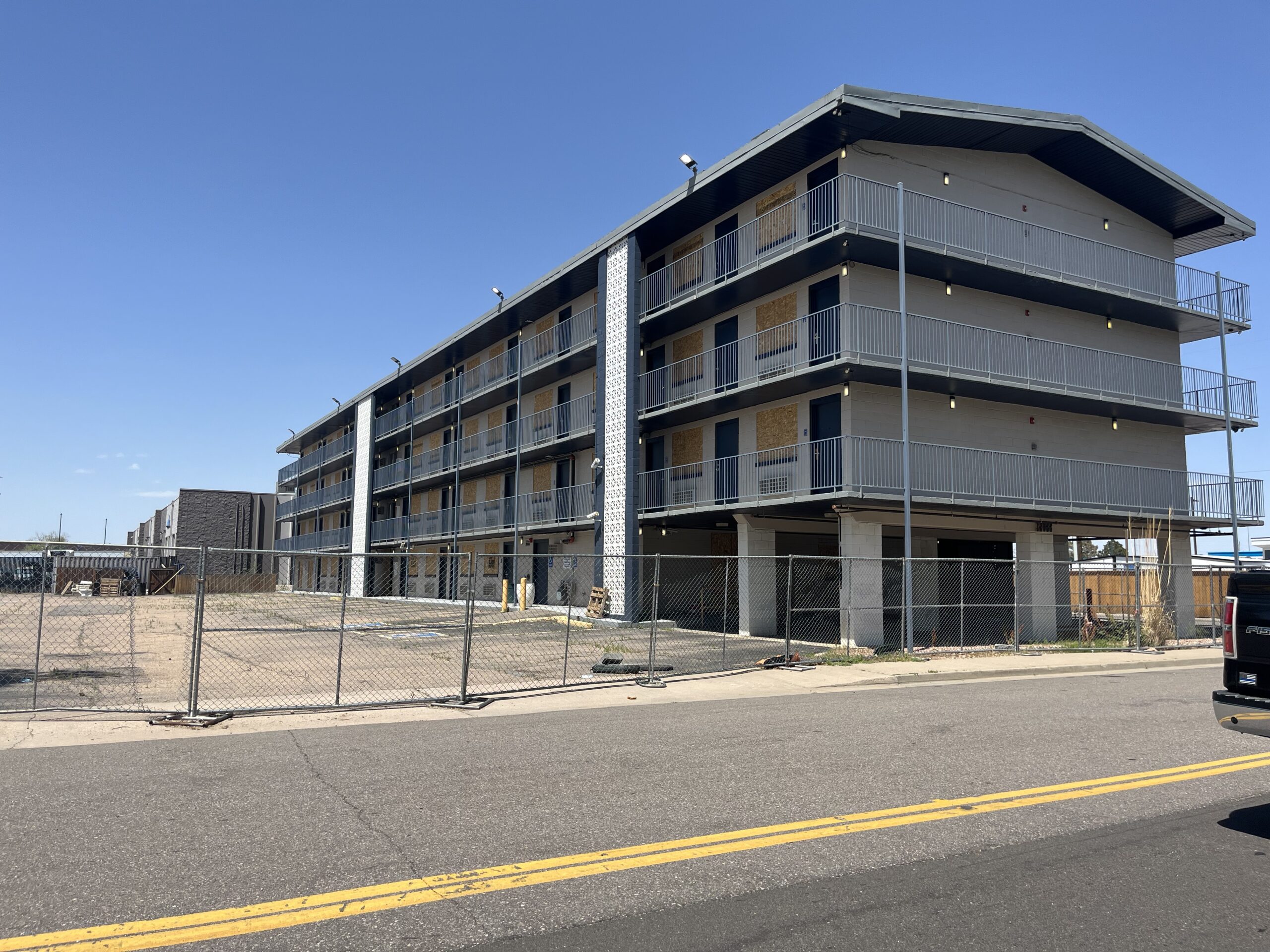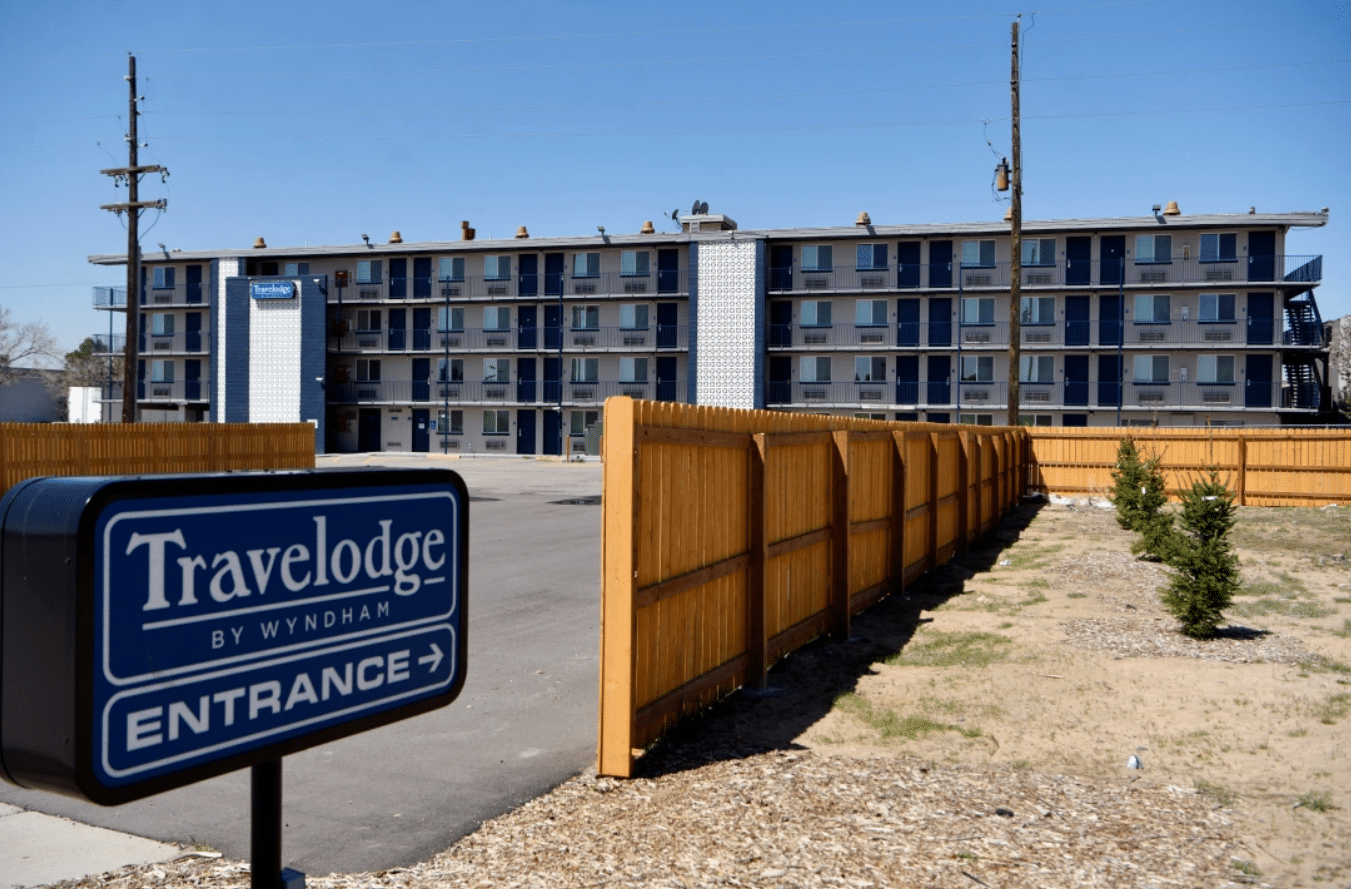
The windows of the motel at 12033 E. 38th Ave. in Denver, seen here last week, were boarded up after the city bought it. (BusinessDen)
Nearly a year after the city of Denver spent millions on a move-in-ready motel in order to house the homeless, no one is living in the now-boarded-up structure — and the city is unable to provide a timeline for when it will be occupied.
The city paid $9 million for the 96-room former Stay Inn at 12033 E. 38th Ave. on Aug. 11, 2023, saying at the time that the building would be turned into “supportive housing,” which provides on-site services in addition to a residence, for the homeless.
The building was furnished. The city’s purchase agreement for the property specifies it was sold with “keys, beds, mattresses, microwaves, refrigerators, cooktops, washers, dryers, nightstands, dressers, and televisions” included.
The deal had been in the works for years. Then-Mayor Michael Hancock and Congresswoman Diana DeGette (D-Denver) held a press conference at the property in May 2021 to announce the city would be buying it. So much time elapsed before closing that Denver ended up paying $1.2 million more than the $7.8 million it had originally planned.
Mayor Mike Johnston, who assumed office last July, has made combatting homelessness his signature issue. He was in Paris last week to discuss “innovation solutions” to address the issue.
Hotels and motels have been a key part of Johnston’s plan. In December, the city began moving the homeless into an Embassy Suites in southeast Denver. The city bought the property in early April. Denver has also signed master leases for multiple other hotels so it could move in the homeless.
The deals have left areas such as Arapahoe Square free of massive tent encampments for the first time in years. But they’ve also left some City Council members concerned about a lack of transparency and spending far exceeding the budget previously disclosed by Johnston’s administration.
All the while, no one has moved into the former Stay Inn, which sits along Peoria Street south of Interstate 70. On the parking lot outside, a network of shed-like structures, erected by the city and dubbed a “microcommunity,” provide basic housing for some.
Asked Thursday why the motel structure sits boarded up, Jose Salas, a spokesman for the mayor, said in an email that “we are fully committed to transforming this property into affordable housing and are in the early stages of making necessary renovations.”
Salas did not respond when asked when individuals might move into the building. He referred a reporter to multiple other city spokespeople, who also did not answer the question.

The former Stay Inn at 12033 E. 38th Ave., seen in 2022. The previous owner bought it with plans to reopen it as a Travelodge, although it never operated under that name. (Eric Lutzens/The Denver Post)
Katie Ross Wamsley, a spokeswoman for Denver’s Department of Housing Stability, or HOST, said in an email that the city “is currently working to convert this property to supportive housing, including looking at any infrastructure work that needs to be done.”
“We are still in the evaluation and planning phase of this project but we are happy to share more when we have specifics,” Wamsley said, later adding “possible renovations include structural repairs to walkways and railings and electrical system repairs.”
There was no active construction underway when a BusinessDen reporter visited last week.
Hugo Weinberger, whose firm sold the city the motel, told BusinessDen last year that he made a number of upgrades to the building, including adding kitchenettes and a sprinkler system to bring the structure in line with current fire code.
When Denver closed on the purchase, a HOST spokesman told BusinessDen the motel property would need to be rezoned to allow for the city’s intended use. Rezonings must be approved by the City Council.
No application has been submitted to rezone the property, another city spokeswoman told BusinessDen Friday.
